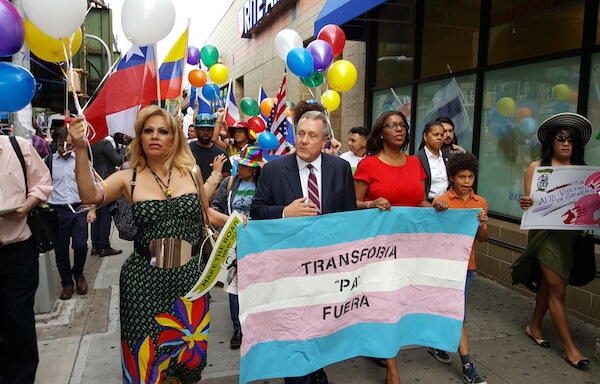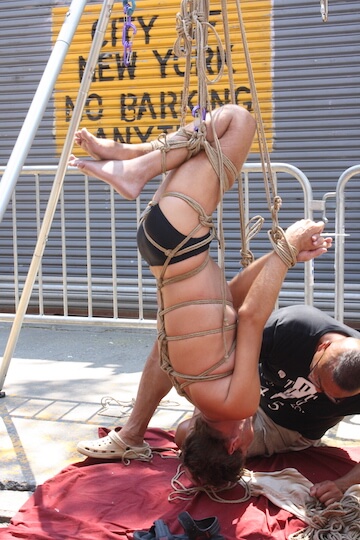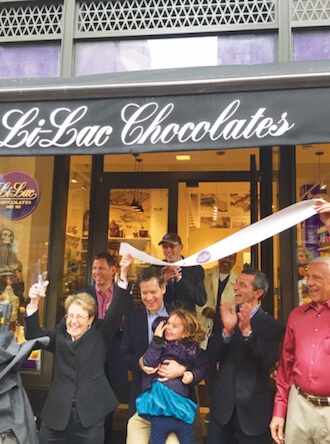John Miller (center), the counterterrorism chief for the NYPD, says he’s already apologized to a lesbian who was raped in Brooklyn’s Prospect Park in 1994 and that he had no role in Daily News columnist Mike McAlary’s unsupported claims the woman had made up her account. | DUNCAN OSBORNE
While the NYPD has quietly apologized to a woman who was raped in Brooklyn’s Prospect Park in 1994 but accused at that time of being a hoaxer and a liar by Daily News columnist Mike McAlary, the woman’s attorney and some LGBTQ activists who believed then and now that the police abetted McAlary in his columns are rejecting that apology.
“I issued an apology to the victim through her lawyer, Martin Garbus,” said John Miller, now the NYPD’s deputy commissioner for intelligence and counterterrorism, during a January 30 press conference held at a Brooklyn police precinct. “I left it up to him and her to make that public. They elected to make it public so it was widely publicized.”
In April of 1994, the woman was raped days before she was to participate in a rally against anti- LGBTQ violence in Brooklyn. Miller, who headed the NYPD’s press office in 1994, initially told reporters that they should be cautious in their reporting on the case. In three columns, McAlary accused her of lying about the rape to promote the rally. The woman, then 27, sued the Daily News and McAlary for libel. The case was dismissed in 1997, and the woman elected to not pursue an appeal though Garbus believed an appeal would be successful.
Lawyer Martin Garbus says counterterrorism chief John Miller’s message insufficient
This year, using DNA recovered from semen found on the woman in 1994, police linked the rape to James Webb who is currently serving a sentence of 75-years-to-life for 1998 sexual assault convictions. Webb is not eligible for a first parole hearing until 2070. The statute of limitations has run out on the 1994 rape and Webb cannot be charged in that case.
While police are saying that they have apologized, Garbus said he received a letter from Miller, but that it did not go far enough.
“We received something from John Miller two weeks ago and I don’t consider it an apology,” Garbus told Gay City News. “She has not received an apology.”
In 1994 and now, LGBTQ activists believed that Miller aided McAlary, who claimed to be relying on anonymous police sources, and they not only want a public apology, they want Miller fired.
“The only apology that would be acceptable from John Miller is for him to resign,” said Matt Foreman, who was the executive director of the New York City Gay and Lesbian Anti-Violence Project, now the Anti-Violence Project, from 1990 to 1996. “John Miller is a secondary rapist and it is insufficient for him to apologize to the victim 23 years later.”
Miller declined to discuss his 1994 dealings with McAlary, who died in 1998, and pointed to the libel lawsuit as an indication of his innocence.
“As for any interactions between myself, Mike McAlary, and the Daily News, that was the subject of a civil case 20-something years ago and there is an extensive record which I invite you to read,” he said. “In that civil case, the Daily News was sued, Mike McAlary was named, I was not. I was a witness.”
NYPD Commissioner James O'Neill (at right) with Mayor Bill de Blasio and First Deputy Commissioner Benjamin Tucker at a January 30 press conference in Brooklyn. | DUNCAN OSBORNE
The NYPD’s quiet response comes as the #MeToo movement is exposing, in some instances, decades-old allegations of sexual harassment and sexual assault against powerful men in the media, government, and private companies, many of whom have since been removed from their jobs.
A #Apology4JaneDoe petition on change.org garnered 918 signatures. While that is a relatively small number, leading LGBTQ activists are among the signatories.
James O’Neill, the city’s police commissioner, attended the same press conference. He also said the NYPD had apologized and that he would not fire Miller.
“What I stated at the press conference was that I know that she was victimized twice,” O’Neill said. “John apologized on behalf of himself and the NYPD. I apologized… This is a case that happened 23 years ago. None of us are perfect in our lives. I think if you look at the body of John’s work, what he’s doing to keep the city safe, I’m not prepared to ask John to leave.”
Garbus, who is a noted First Amendment attorney who typically represents publishers, devoted an entire chapter to the libel lawsuit in his 1998 book, “Tough Talk: How I Fought for Writers, Comics, Bigots, and the American Way.”
Garbus wrote that in earlier legal proceedings unrelated to the woman’s libel lawsuit, McAlary admitted to inventing stories and fabricating quotes to “illustrate” a story.
He was deposed twice in the libel case and eventually had to reveal that he had a single source for his columns — Miller.
In his deposition, Miller said he had never supported McAlary’s assertions other than initially telling all reporters to proceed cautiously on the story.
Only McAlary publicly doubted the woman. In 1994, three Daily News reporters “warned their editors that some of their police contacts disputed the accuracy of [McAlary’s] account,” Garbus wrote in his book.
In 1994, 30 members of the Daily News reporting staff signed a petition calling McAlary’s first column “a disgrace” and demanding that the paper issue a public apology to the woman and the newspaper’s readers, Garbus wrote.




































